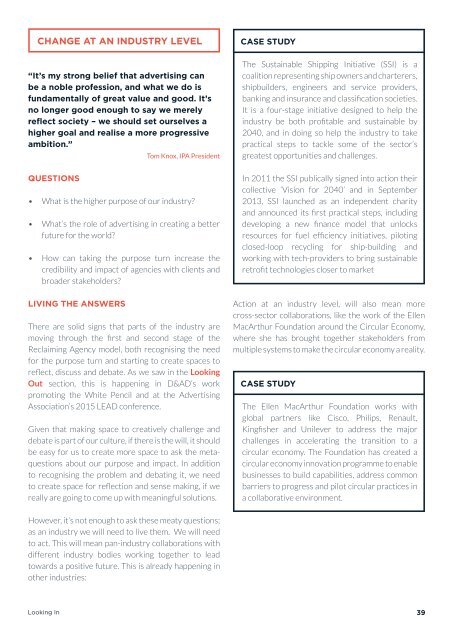RECLAIMING AGENCY
1GuCfmL
1GuCfmL
You also want an ePaper? Increase the reach of your titles
YUMPU automatically turns print PDFs into web optimized ePapers that Google loves.
CHANGE AT AN INDUSTRY LEVEL<br />
“It’s my strong belief that advertising can<br />
be a noble profession, and what we do is<br />
fundamentally of great value and good. It’s<br />
no longer good enough to say we merely<br />
reflect society – we should set ourselves a<br />
higher goal and realise a more progressive<br />
ambition.”<br />
Tom Knox, IPA President<br />
QUESTIONS<br />
• What is the higher purpose of our industry?<br />
• What’s the role of advertising in creating a better<br />
future for the world?<br />
• How can taking the purpose turn increase the<br />
credibility and impact of agencies with clients and<br />
broader stakeholders?<br />
LIVING THE ANSWERS<br />
There are solid signs that parts of the industry are<br />
moving through the first and second stage of the<br />
Reclaiming Agency model, both recognising the need<br />
for the purpose turn and starting to create spaces to<br />
reflect, discuss and debate. As we saw in the Looking<br />
Out section, this is happening in D&AD’s work<br />
promoting the White Pencil and at the Advertising<br />
Association’s 2015 LEAD conference.<br />
Given that making space to creatively challenge and<br />
debate is part of our culture, if there is the will, it should<br />
be easy for us to create more space to ask the metaquestions<br />
about our purpose and impact. In addition<br />
to recognising the problem and debating it, we need<br />
to create space for reflection and sense making, if we<br />
really are going to come up with meaningful solutions.<br />
CASE STUDY<br />
The Sustainable Shipping Initiative (SSI) is a<br />
coalition representing ship owners and charterers,<br />
shipbuilders, engineers and service providers,<br />
banking and insurance and classification societies.<br />
It is a four-stage initiative designed to help the<br />
industry be both profitable and sustainable by<br />
2040, and in doing so help the industry to take<br />
practical steps to tackle some of the sector’s<br />
greatest opportunities and challenges.<br />
In 2011 the SSI publically signed into action their<br />
collective ‘Vision for 2040’ and in September<br />
2013, SSI launched as an independent charity<br />
and announced its first practical steps, including<br />
developing a new finance model that unlocks<br />
resources for fuel efficiency initiatives, piloting<br />
closed-loop recycling for ship-building and<br />
working with tech-providers to bring sustainable<br />
retrofit technologies closer to market<br />
Action at an industry level, will also mean more<br />
cross-sector collaborations, like the work of the Ellen<br />
MacArthur Foundation around the Circular Economy,<br />
where she has brought together stakeholders from<br />
multiple systems to make the circular economy a reality.<br />
CASE STUDY<br />
The Ellen MacArthur Foundation works with<br />
global partners like Cisco, Philips, Renault,<br />
Kingfisher and Unilever to address the major<br />
challenges in accelerating the transition to a<br />
circular economy. The Foundation has created a<br />
circular economy innovation programme to enable<br />
businesses to build capabilities, address common<br />
barriers to progress and pilot circular practices in<br />
a collaborative environment.<br />
However, it’s not enough to ask these meaty questions;<br />
as an industry we will need to live them. We will need<br />
to act. This will mean pan-industry collaborations with<br />
different industry bodies working together to lead<br />
towards a positive future. This is already happening in<br />
other industries:<br />
Looking In<br />
39


